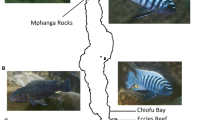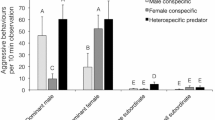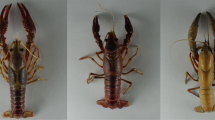Summary
Individual Midas cichlids (Cichlasoma citrinellum) show persistent differences in aggressive behavior toward dummy fish. The starting question was whether the level of such behavior can be used to predict the winner of a fight. In the first (long-term) experiment two fish were matched for size, color, and sex. After 24 h the opaque barrier separating the 2 fish was removed; they immediately behaved aggressively. Scores for aggression toward dummies did not predict the winners, nor did taking the initiative in escalation. But weight did foretell the winners, who averaged only 2% heavier than their opponents. The conventional display phase of such fights was brief (20% of total duration), and escalation was rapid. Both winners and losers sustained damage, but losers accumulated damage faster than winners. In the subsequent (short-term) experiment the fish were separated only 1–2 h. Now aggression scores predicted winners, and winners were the fish who escalated. Weight of fish had no effect. The conventional phase was relatively much longer, about half the length of the fight. Losers accumulated damage at the same rate as the losers in the long-term experiment, but the fights were shorter; winners suffered little damage. The fish had difficulty assessing one another. Fighting prowess was remarkably uniform when weight was factored out. Daring to escalate, in contrast, varied among individuals and correlated with aggression scores. Prowess (=weight) determined the outcome in the long-term experiment, which may find its parallel in nature in intraterritorial disputes. Daring to escalate determined the winner in the short-term experiment; this may be comparable to establishing a territory in nature.
Prowess probably results from strong directional selection because it has low costs and high benefits. In contrast, daring is subject to bi-directional selection because both costs and benefits are high. Resource holding potential is conventionally viewed as deriving from prowess of self and opponent and value of resource; to that one must add the individual's inherent aggressiveness.
Similar content being viewed by others
References
Bakker TCM, Sevenster P (1983) Determinants of dominance in male sticklebacks (Gasterosteus aculeatus L.). Behaviour 86:55–71
Barlow GW (1983) Do gold Midas cichlid fish win fights because of their color, or because they lack normal coloration? Behav Ecol Sociobiol 13:197–204
Barlow GW, Rogers W, Bond AB (1984) Dummy-elicited aggressive behavior in the polychromatic Midas cichlid. Biol Behav 9:115–130
Bekoff M, Tyrrell M, Lipetz VE, Jamieson R (1981) Fighting patterns in young coyotes: Initiation, escalation, and assessment. Aggress Behav 7:225–244
Carlstead K (1981) Motivational influences on individual and species differences in response to conspecifics in three Haplochromis species (Pisces: Cichlidae). Ph.D. Dissertation, University of Groningen
Caryl PG (1979) Communication by agonistic displays: what can games theory contribute to ethology? Behaviour 68:136–169
Caryl PG (1981) Escalated fighting and the war of nerves: Games theory and animal combat. Perspect Ethol 4:199–224
Clutton-Brock TH, Albon SD (1979) The roaring of red deer and the evolution of honest advertisement. Behaviour 69:144–170
Dow M, Ewing AS, Sutherland I (1976) Studies on the behaviour of cyprinodont fish. III. The temporal pattern of aggression in Aphyosemion striatum (Boulenger). Behaviour 59:252–268
Enquist M, Leimar O (1983) Evolution of fighting behaviour: Decision rules and assessment of relative strength. J Theoret Biol 102:387–410
Figler MH, Einhorn DM (1983) The territorial prior residence effect in convict cichlids (Cichlasoma nigrofasciatum Gunther). Temporal aspects of establishment and retention, and proximate mechanisms. Behaviour 85:157–181
Frey DF, Miller RJ (1972) The establishment of dominance relationships in the blue gourami, Trichogaster trichopterus (Pallus). Behaviour 42:8–62
Hampton RE (1984) A statistical and information analysis of the combat behavior of a South American leaf fish, Polycentrus schomburkgi (sic.). In: Horner NV (ed) Festschrift for Walter W. Dalquest in honor of his sixty-sixth birthday. Dept Biology, Midwestern State Univ, pp 67–75
Hinde RA (1981) Animal signals: ethological and games-theory approaches are not incompatible. Anim Behav 29:535–542
Hollander M, Wolfe DA (1973) Nonparametric statistical methods. Wiley, New York, p 503
Jakobsson S, Radesater T, Jarvi T (1979) On the fighting behavior of Nannacara anomala (Pisces, Cichlidae). Z Tierpsychol 49:210–220
Maynard Smith J, Parker GA (1976) The logic of asymmetric contests. Anim Behav 24:159–175
Miller RJ (1964) Studies on the social behavior of the blue gourami Trichogaster trichopterus (Pisces: Belontidae). Copeia 1964:469–496
Mosler H-J (1985) Making the decision to continue the fight or to flee. An analysis of contests between male Haplochromis burtoni (Pisces). Behaviour 92:129–145
Parker GA (1974) Assessment strategy and the evolution of fighting behaviour. J Theoret Biol 47:223–243
Parker GA (1984) Evolutionary stable strategies. In: Krebs IR, Davies NB (eds) Behavioural ecology, 2nd ed, Sinauer, Sunderland, Massachusetts, pp 30–61
Parker GA, Rubenstein DI (1981) Role assessment, reserve strategy, and acquisition of information in asymmetric animal conflicts. Anim Behav 29:221–240
Rand AS, Rand WM (1976) Agonistic behavior in nesting iguanas: a stochastic analysis of dispute settlement dominated by the minimization of energy cost. Z Tierpsychol 40:279–299
Simpson MJA (1968) The display of the Siamese fighting fish Betta splendens. Anim Behav Monogr 1:1–73
Author information
Authors and Affiliations
Rights and permissions
About this article
Cite this article
Barlow, G.W., Rogers, W. & Fraley, N. Do Midas cichlids win through prowess or daring? It depends. Behav Ecol Sociobiol 19, 1–8 (1986). https://doi.org/10.1007/BF00303836
Received:
Accepted:
Issue Date:
DOI: https://doi.org/10.1007/BF00303836




